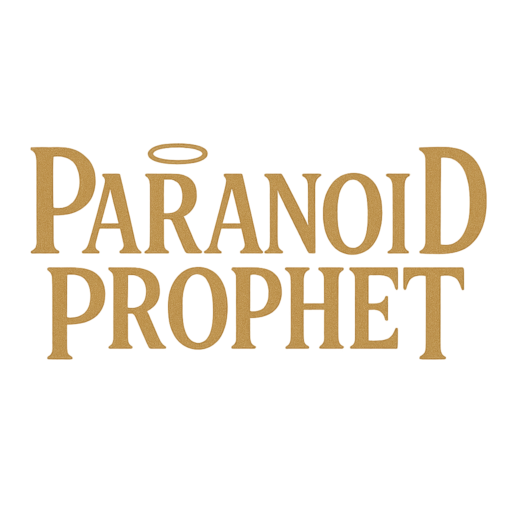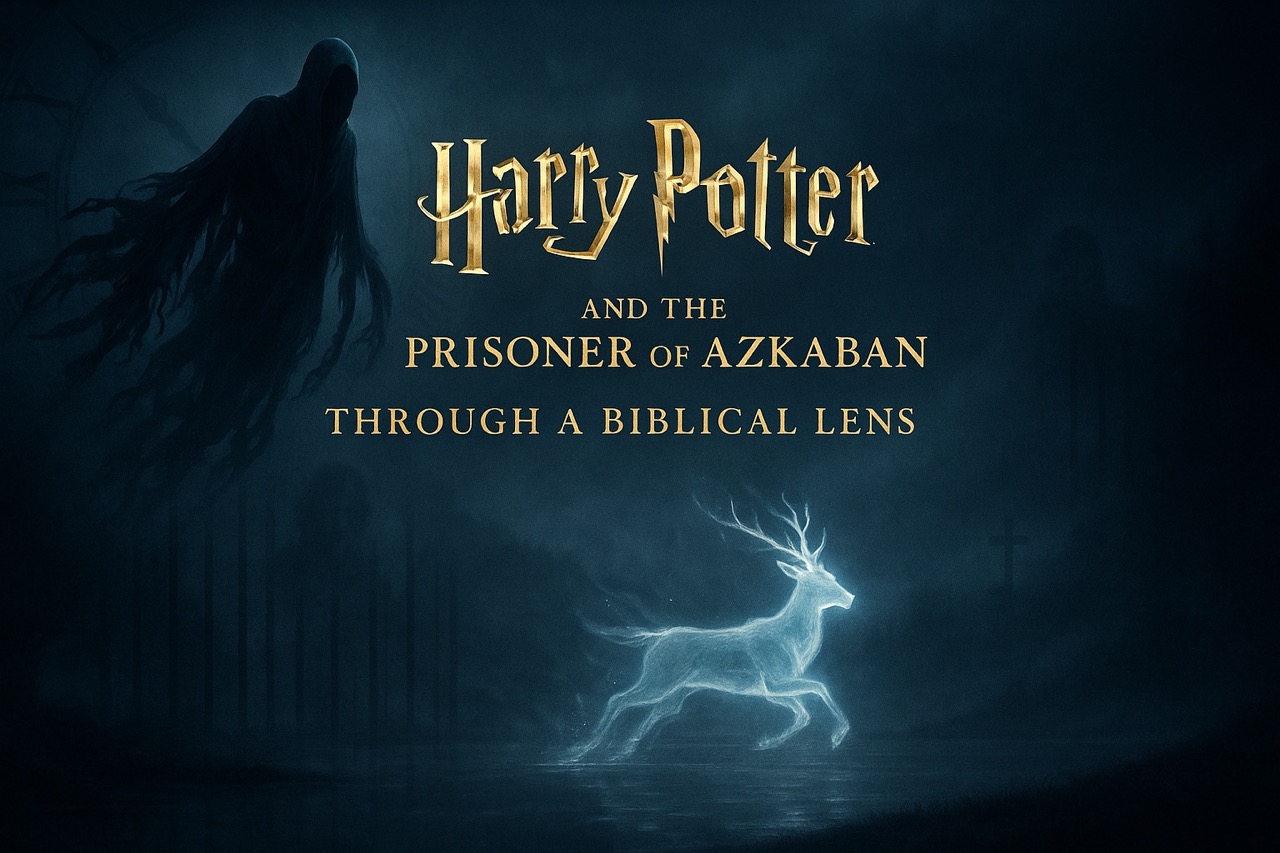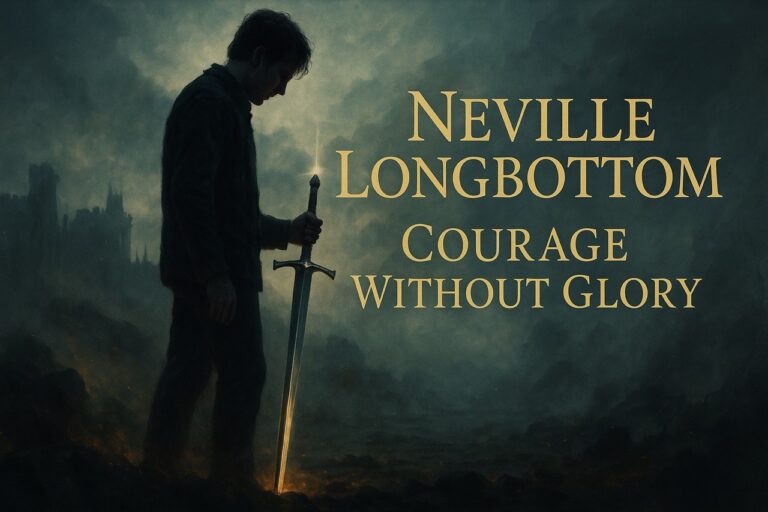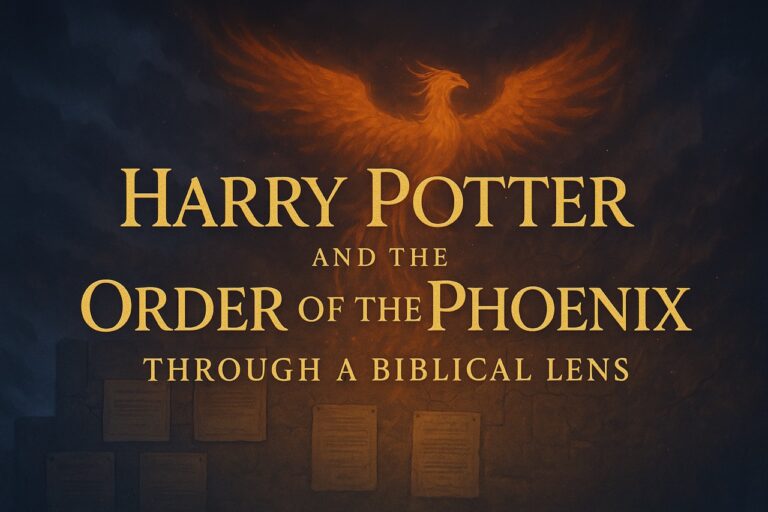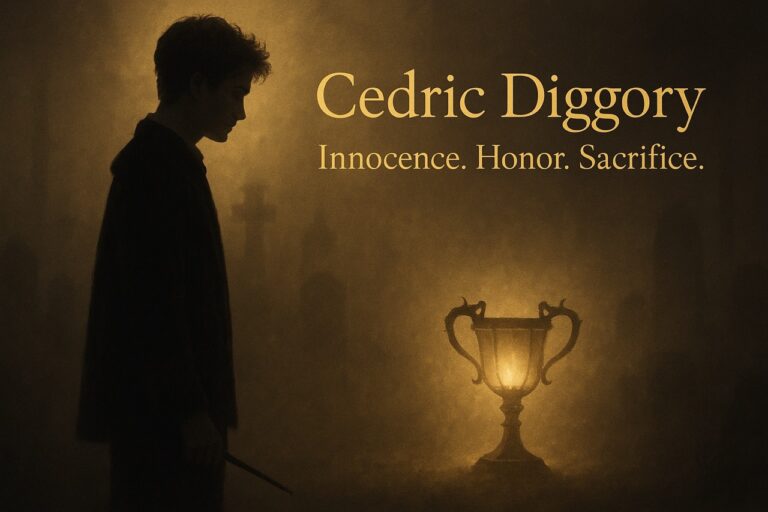This Prisoner of Azkaban biblical review uncovers one of the most emotionally complex and symbolically rich chapters in the Harry Potter series. Gone are the bright halls of Hogwarts and whimsical magic — replaced with shadows, fog, and fear. In this film, time bends, fear has a face, and truth hides beneath reputation. As Christian viewers, we’re invited to go deeper: What do Dementors reveal about spiritual oppression? What does Sirius Black’s false guilt say about justice and identity? And how do we resist darkness — not with spells, but with something far more powerful? In this article, we’ll examine the film through a biblical lens to expose what it gets right, where it goes astray, and how families can talk about spiritual truths hidden beneath the surface.
🧒 Parental Guide – Prisoner of Azkaban Biblical Review
Suggested Viewing Age: ★★★★☆ (10+ with strong guidance)
Parental Discernment Level: High
This installment marks a dramatic tonal shift in the series. Directed by Alfonso Cuarón, Prisoner of Azkaban is darker, more introspective, and deals with heavier spiritual metaphors than the first two films. There are no flashy villains — just misunderstood prisoners, soul-sucking wraiths, and the weight of time itself.
⚠️ Content Warnings for Christian Families:
- Dementors – Terrifying, ghost-like beings that drain joy and hope. Their attacks feel like emotional trauma or demonic oppression.
- Werewolf transformation – Disturbing scenes of Professor Lupin losing control, symbolic of internal brokenness or sin nature.
- Time travel & fate manipulation – Introduces the idea that time can be altered without consequences, contrary to biblical teachings about God’s sovereignty.
- Dark emotional tone – Fear, depression, betrayal, and moral ambiguity are constant undercurrents.
🗣️ Family Discussion Topics:
- What are Dementors a symbol of? (Fear, spiritual despair, or demonic attack)
- Why do Harry and others fear Sirius Black? How does this connect to false accusations or redemption?
- Does time belong to us or to God? What happens when we try to change fate?
- Is Lupin’s werewolf condition a curse or a metaphor? How does it relate to sin nature in Scripture?
- How can joy and memory become spiritual weapons? What does the Bible say about dwelling on what is good? (Philippians 4:8)
🧠 What This Prisoner of Azkaban Biblical Review Reveals
The first time through, Prisoner of Azkaban feels like a story about escape, mystery, and monsters. But on rewatch — especially through a biblical lens — it becomes clear this chapter is all about fear, false judgment, time, and identity.
🕯️ Sirius Black and the Power of False Accusation
For most of the movie, Sirius Black is feared as a murderer, traitor, and servant of evil. He’s the subject of whispered rumors, wanted posters, and childhood nightmares.
But the twist? He’s innocent.
This inversion echoes a common biblical pattern: the misunderstood redeemer. Like Joseph in prison, Daniel under accusation, or even Christ Himself, Sirius suffers for what he didn’t do.
“They hated me without a cause.” – John 15:25
“The Lord will bring to light what is hidden in darkness…” – 1 Corinthians 4:5
In a world without divine justice, Sirius’s redemption is achieved only by human discovery — but it still shows how truth and loyalty eventually shine through lies.
👤 The Werewolf as a Symbol of Sin Nature
Professor Lupin is kind, wise, and deeply respected. Yet once a month, he loses all control — transformed into something terrifying. He hides his condition, afraid of what others will think.
This is a potent metaphor for the fallen human condition — the inner curse that Paul writes about in Romans 7: “I do not do what I want, but the evil I do not want is what I keep on doing.”
Lupin’s condition echoes:
- Hidden sin
- Generational curses
- The shame we carry but can’t shake
But unlike in Scripture, the solution here is not spiritual healing, but control and secrecy — a dangerous contrast worth exploring with young viewers.
⌛ The Time-Turner and the Illusion of Control
Hermione’s time travel subplot seems light at first… until she and Harry use it to rewrite events and save lives. It’s exhilarating, but raises serious theological questions:
- Can we undo suffering without consequence?
- Who decides what timeline is “right”?
- Is time a tool for us — or sacred territory of God?
In a biblical worldview, God alone stands outside time (Isaiah 46:10), and our call is not to control the past, but to be faithful in the present. The film’s message — that time can be manipulated with wisdom — may feed a false sense of sovereignty.
👁️ Dementors: A Manifestation of Spiritual Fear
Dementors don’t just scare people — they drain hope, peace, and the will to live. Harry hears his mother’s screams. Others faint, freeze, or go numb.
They’re not just monsters. They’re a visual symbol of spiritual depression, trauma, or even demonic oppression.
And the defense? The Patronus, a silver light summoned through focused memory of joy, peace, or love.
This beautifully echoes Psalm 27:1 – “The Lord is my light and my salvation — whom shall I fear?”
While the Patronus is fictional, the biblical truth is clear: light drives out darkness, and remembrance of truth protects the soul.
✝️ Biblical Truths in Harry Potter and the Prisoner of Azkaban
Though steeped in fantasy, Prisoner of Azkaban unexpectedly echoes deep spiritual realities. These glimpses of truth — whether intentional or accidental — offer moments of alignment with the gospel narrative, especially when viewed with discernment.
🌟 Light Casts Out Fear
The Patronus — a radiant defense against the soul-sucking Dementors — is conjured by remembering joy, love, and peace. For Harry, it’s a memory of his parents. But the deeper truth is this:
Light defeats fear.
Hope is a weapon.
And joy — not power — is what protects the soul.
This aligns beautifully with John 1:5 — “The light shines in the darkness, and the darkness has not overcome it.”
And with Psalm 27:1 — “The Lord is my light and my salvation — whom shall I fear?”
🕊️ True Identity is Not What Others Say
Sirius Black’s entire arc mirrors a biblical principle: Your identity is not your reputation.
He is falsely accused, wrongly imprisoned, and feared by all — but he remains loyal to truth.
His redemption reflects Christlike imagery:
- Condemned though innocent
- Hunted though he brings freedom
- Misunderstood, yet devoted to saving Harry
While not a perfect Christ figure, Sirius points to the idea that truth outlives lies — a reflection of John 8:32: “Then you will know the truth, and the truth will set you free.”
⛓️ Captivity, Freedom, and Justice
The injustice of Azkaban prison — where inmates lose their minds under the torment of Dementors — reflects a world without grace. The only escape comes not through law or truth, but through personal agency.
Still, this tension creates a teaching moment: only true justice comes from a higher Judge.
Sirius’s freedom feels hollow without that, but it opens the door for biblical contrast: only God can truly free the captive (Isaiah 61:1).
🧠 The Power of Memory in Spiritual Warfare
The Patronus is only cast when the wizard calls upon a deeply rooted, joyful memory. This is shockingly close to the biblical practice of spiritual remembrance:
- “Remember the Lord your God” (Deuteronomy 8:2)
- “Fix your thoughts on what is true… and praiseworthy” (Philippians 4:8)
In times of fear, darkness, or despair — Scripture urges us to remember who God is, and what He’s done.
Prisoner of Azkaban presents memory not just as nostalgia, but as a weapon — and that’s a truth the Bible affirms.
⚠️ Where Prisoner of Azkaban Clashes with Scripture
For all its symbolic insight, Prisoner of Azkaban presents several spiritual and theological conflicts that Christians should approach with discernment. These aren’t just thematic — they challenge the foundational worldview of the story itself.
🪄 Magic Remains the Source of Salvation
As in all previous films, magic is the central solution to every problem — defense against Dementors, time travel, self-protection, and truth discovery. There is no higher power appealed to, no divine guidance, and no moral authority beyond wizard law.
In Scripture, salvation comes from God alone (Psalm 3:8), and wisdom is not conjured — it is revealed through relationship with Him (James 1:5).
⌛ Time is Treated as Manipulable and Morally Neutral
The Time-Turner subplot portrays time as a tool — something to be used by those “wise enough” to handle it. But this invites a worldview where man is sovereign, not God.
Biblically, time is sacred. God exists outside of it (Isaiah 46:10), and we are called to trust His timing, not tamper with it. There’s no accountability in the film for altering fate — a dangerous idea when compared to biblical teaching.
🌫️ No Moral Absolute or Higher Judge
Sirius Black’s redemption comes not from an authoritative declaration of truth, but from a small group of friends who choose to believe him. The justice system fails, truth is relative, and public opinion remains unchanged.
In a biblical worldview, truth doesn’t depend on popularity. God is Judge, and righteousness is not determined by majority consensus (Isaiah 5:20).
🧍 Good and Evil Blur Without Clear Lines
Unlike earlier films, Azkaban thrives in moral gray. The “monster” (Sirius) is good. The hero (Lupin) is cursed. The magical authorities are often blind. Even Harry, who casts powerful Patronus magic, walks the line between mercy and revenge.
This complexity can be meaningful — but without Scripture as a standard, the story risks equating moral confusion with maturity. Scripture, however, tells us to test the spirits and discern good from evil (1 John 4:1, Hebrews 5:14).
While not inherently dangerous on its own, Prisoner of Azkaban subtly encourages emotional reasoning over spiritual truth. That’s why watching with discernment — and comparing every message to Scripture — is essential.
✝️ Final Reflection: When Fear Shadows the Truth
Prisoner of Azkaban is more than a fantasy film — it’s a meditation on fear, misunderstanding, and identity. And in many ways, it mirrors our own spiritual journey.
We live in a world where truth is often hidden, where fear drains joy, and where the innocent are sometimes condemned. Sirius Black’s story reminds us that reputation isn’t reality. Lupin’s curse shows that inner struggles don’t disqualify us from doing good. And the Patronus — a light summoned through memory — speaks to the power of hope grounded in truth.
But the story also falls short. It replaces divine sovereignty with human control. It offers redemption without repentance. And it sees time and morality as tools to be bent by the will of the wise.
Still, Christians can engage with this film not to absorb its worldview, but to test it, contrast it, and use it as a teaching tool. Because even in stories that miss the mark, God has a way of making truth echo… if we’re listening.
🔗 Related Reading on Paranoid Prophet
🧠 Identity, Condemnation & Redemption
- Was Jesus a Liar?
- Was Jesus a Madman?
- Jesus in Revelation 1 – Eyes Like Fire
- Proverbs 13:20 – The Company You Keep
- Proverbs 16:28 – Whisperers and Division
😈 Spiritual Warfare, Sin Nature & the Inner Struggle
- Proverbs 14:12 – The Way That Seems Right
- Proverbs 109 Explained – False Accusation and Justice
- Messianic Prophecies of Jesus’ Suffering
- Moloch Worship & Modern Media Parallels
🌟 Memory, Light, and Hope as Weapons
- Proverbs 4:18 – The Path of the Righteous
- Proverbs 18:21 – Power of the Tongue and Spirit
- Who Is God? A Simple Breakdown
📖 Previous Harry Potter Reviews
- Harry Potter and the Sorcerer’s Stone – A Biblical Review
- Harry Potter and the Chamber of Secrets – A Biblical Review
🔗 Christian Reviews of Harry Potter and the Prisoner of Azkaban
- Plugged In (Focus on the Family)
A detailed review highlighting positive themes like courage and selflessness, while also noting concerns about the film’s darker elements.
Plugged In - ChristianAnswers.net
Offers a balanced perspective, acknowledging the film’s storytelling and visuals, while advising parental caution due to its darker tone.
Christian Answers - Christian Answers for the New Age (Marcia Montenegro)
Discusses themes such as magic and pranks, providing insights for parents on the film’s content.
Christian Answers New Age - Redeemed Reader
Explores how Christian families can approach the Harry Potter series, emphasizing parental discernment and individual conviction.
Redeemed Reader - Patheos – FilmChat Blog
Analyzes the film’s themes from a Christian viewpoint, discussing the portrayal of magic and its implications.
Patheos
🙋♂️ Prisoner of Azkaban Christian FAQ
❓What do the Dementors symbolize in Prisoner of Azkaban?
Dementors represent spiritual oppression, trauma, and fear. They drain joy and peace, much like how demonic forces or emotional despair can attack the soul. In biblical terms, they reflect the effect of evil without Christ’s light.
❓What is the Patronus, and does it have biblical meaning?
While fictional, the Patronus — a protective light drawn from joyful memory — can mirror biblical ideas of hope, remembrance, and spiritual armor (Philippians 4:8, Ephesians 6:11). It is not a perfect parallel, but it offers a teaching moment about how joy and truth defend the heart.
❓Is Sirius Black a Christ figure?
He echoes elements of Christ: falsely accused, suffering unjustly, and ultimately a protector. But he lacks holiness, sacrifice, and divine redemption. He’s better seen as a symbol of misunderstood righteousness, like Joseph or Daniel.
❓Is time travel biblical or dangerous?
In this film, time is controlled and altered by people — without consequence. Biblically, only God is sovereign over time (Ecclesiastes 3:11, Isaiah 46:10). While fun as fiction, stories like this should provoke discussion about the limits of human control.
❓What does Lupin’s werewolf curse represent?
Lupin’s condition mirrors the sin nature Paul describes in Romans 7 — the internal battle between who we want to be and the brokenness we carry. It also reflects shame, self-hiding, and the longing to be healed.
❓Can Christians watch Prisoner of Azkaban?
Yes — but with discernment. The film presents truth and light but also blurs moral lines and replaces God with self. It can be enjoyed with Scripture as your compass and open conversation as your guardrail.
